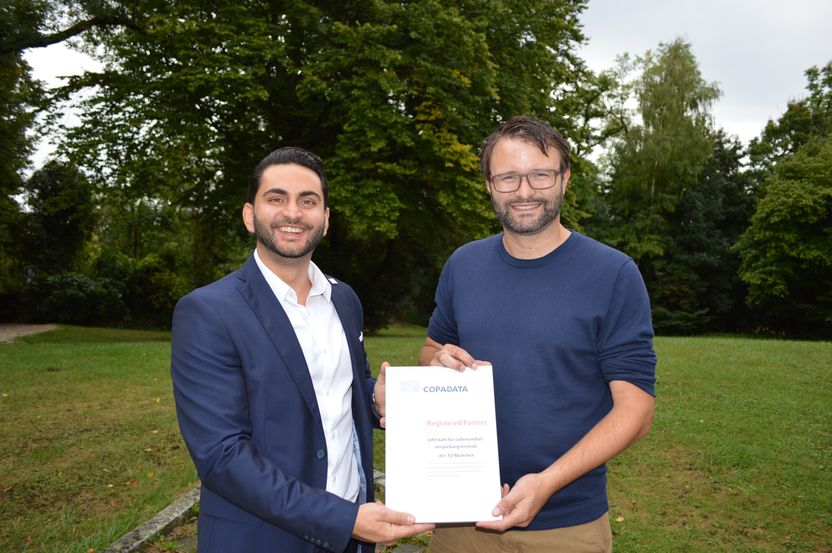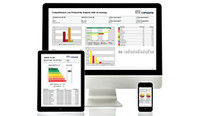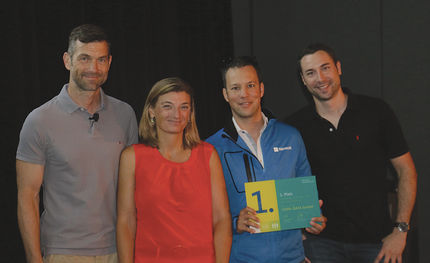The chair of food packaging technology becomes a partner of the automation specialist
COPA-DATA is working with TUM, one of the most renowned technical universities in Europe
Advertisement
COPA-DATA and the Technische Universität München (TUM) have made it official: As of now, the chair of food packaging technology at the TUM is a COPA-DATA Registered Partner in the field of educational institutions and research facilities. The focus of the partnership is close cooperation in sciences and teaching, as well as promoting new blood and innovation.

The chair of food packaging technology at the TUM becomes a COPA-DATA Registered Partner (on the left in the picture: George Yamanoglu, New Markets & Partner Consultant, COPA-DATA Germany; on the right in the picture: Stefan Flad, postgraduate and lecturer at the technical university’s chair of food packaging technology in Freising, Germany).
COPA-DATA Headquarters
COPA-DATA has been working together with the chair of food packaging technology of the TUM on many levels since 2008. The partnership will now have a defined, official foundation, on the basis of the existing cooperation. For COPA-DATA, this cooperation forms the framework for joint projects and regular exchange on developments and trends in science and industry.
“The partnerships with educational institutions and research facilities are an important instrument for our innovation strategy. Networking with universities provides an impulse for innovations in industry, allows us access to scientific findings and guarantees the training of highly-qualified graduates of further education institutes. At the same time, we can be present as a promoter and adviser in universities”, explains George Yamanoglu, New Markets & Partner Consultant at COPA-DATA in Germany.
Guarantee knowledge transfer, strengthen the power to innovate
As part of the cooperation, COPA-DATA is providing insights into practice, technical support and zenon, the family of software products for HMI/SCADA and dynamic production reporting, to the chair, for educational purposes and project work. Furthermore, COPA-DATA is involved with lectures in relation to the issues of HMI/SCADA, Industry 4.0, security, predictive analytics, augmented reality and bachelor and master dissertations.
“We are pleased to be able to benefit from COPA-DATA's practical know-how and the many years of proven expertise in the industry. A lively exchange of knowledge is indispensable for our chair of food packaging technology. The cooperation promotes not just research, but also the transfer of knowledge in the industry”, explains Stefan Flad, postgraduate and lecturer at the technical university’s chair of food packaging technology in Freising, Germany.
Weihenstephan Standards – creating future-proof standards together
The joint work and regular exchange between science and the economy have already borne fruit. COPA-DATA has, since 2008, become involved in the “Weihenstephan Standards” (WS) working group, under the general direction of the chair of food packaging technology at the TUM. The Weihenstephan Standards allow a manufacturer-independent connection between HMI/SCADA or MES systems and machines in the filling and packaging industry, as well as the foodstuffs industry. For users, this means that the integration of machines into assembly lines becomes significantly easier. The standardization comprises data content (data points as well as the definition of data points), a physical interface and a set of commands. The Weihenstephan Standards allow a standardized and uniform evaluation of operating data, such as the calculation of overall equipment effectiveness (OEE), complete traceability of batches and a detailed analysis of disruptions. Numerous machine and equipment manufacturers have already implemented this interface; many domestic and international companies now use the Weihenstephan Standards in their filling and packaging equipment.
“Transparent production and business processes, as well as consistent digital networking decide a company's success and competitiveness nowadays. A systematic basis of data and comprehensive processing and provision of information form the basis of this. The ‘Weihenstephan Standards’ guarantee data recording throughout the process in the foodstuffs and beverages industry, thus supporting quality assurance in manufacturing companies and allowing considerable increases in efficiency”, explains George Yamanoglu.
Other news from the department business & finance
Most read news
More news from our other portals
See the theme worlds for related content
Topic world Quality assurance
In the food industry, quality assurance is about much more than safety. It's about ensuring consistent standards that meet consumers' taste, nutritional and aesthetic expectations. Using state-of-the-art analytical methods and strict protocols, Quality Assurance ensures that every product delivers on the brand's promise. From appearance and taste to texture and shelf life, Quality Assurance ensures consumers get exactly what they expect.

Topic world Quality assurance
In the food industry, quality assurance is about much more than safety. It's about ensuring consistent standards that meet consumers' taste, nutritional and aesthetic expectations. Using state-of-the-art analytical methods and strict protocols, Quality Assurance ensures that every product delivers on the brand's promise. From appearance and taste to texture and shelf life, Quality Assurance ensures consumers get exactly what they expect.



























































